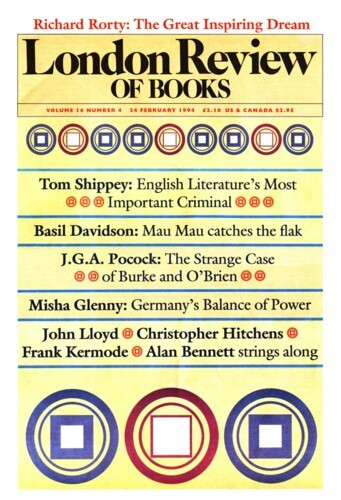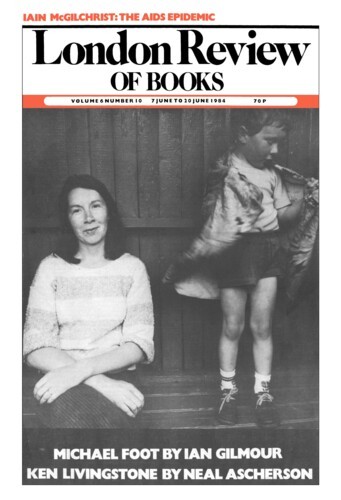Salman Rushdie
Salman Rushdie wrote half a dozen pieces for the LRB in the paper’s early years, including reviews of Calvino and García Márquez, a short story (‘The Prophet’s Hair’) and a piece reflecting on ‘Imaginary Homelands’, the Bombay of his childhood and the writing of Midnight’s Children.
Kundera and Kitsch
7 June 1984
Pieces about Salman Rushdie in the LRB
The Profusion Effect: Salman Rushdie’s ‘Quichotte’
Michael Wood, 12 September 2019
‘One can feel that there is always a camera left out of the picture,’ Stanley Cavell writes in The World Viewed. He is writing of a literal movie camera, but he suggests a...
Closely Observed Trains on a Sea Coast in Bohemia: Rushdie’s Latest
Christopher Tayler, 16 November 2017
Some people don’t like the idea that they may be living in a metropolitan bubble, but René Unterlinden, the narrator of Salman Rushdie’s latest book, has been raised to call...
Imagine his dismay: Salman Rushdie
Carlos Fraenkel, 18 February 2016
Salman Rushdie’s latest novel is a version of The Arabian Nights – two years, eight months and 28 nights adds up to 1001 of them. But it’s updated in every way. The climax,...
The Audience Throws Vegetables: Salman Rushdie
Colin Burrow, 8 May 2008
Even serious and persistent readers often say they can’t finish Salman Rushdie’s novels. His unfinishability has some obvious causes. Wearyingly encrusted description is the natural...
Flame-Broiled Whopper: Salman Rushdie
Theo Tait, 6 October 2005
With time and overuse, artistic style degenerates into mannerism. This is especially true of magic realism. Following the success of Gabriel García Márquez, a flood of...
The First Bacchante: ‘The Ground Beneath Her Feet’
Lorna Sage, 29 April 1999
‘Where the plates of different realities met, there were shudders and rifts. Chasms opened. A man could lose his life.’ This seismic imagery is, in Salman Rushdie’s The Ground beneath Her Feet, the...
Shenanigans
Michael Wood, 7 September 1995
The Moor’s last sigh is several things, both inside and outside Salman Rushdie’s sprawling new novel. It is the defeated farewell of the last Moorish ruler in Spain, the Sultan...
Deadly Fetishes
Terry Eagleton, 6 October 1994
Magic realism is usually thought of as a Third World genre, appropriate to a place where the supernatural is still taken seriously, where fable and folk tale still flourish and where fantasy can...
Toto the Villain
Robert Tashman, 9 July 1992
A good piece of writing on film, produced by a major literary figure, is as rare as a successful film adaptation of a major literary work. The fear and condescension felt towards the medium by...
Embracing Islam
Patrick Parrinder, 4 April 1991
‘Our lives teach us who we are,’ Salman Rushdie observed in one of three widely-read and somewhat contradictory statements of faith that he published last year. These are now...
Saving the Streams of Story
Frank Kermode, 27 September 1990
No doubt it would be possible to apply to this exercise in magic irrealism the terminology of V. Propp’s Morphology of the Folktale, by way of demonstrating that Salman Rushdie’s...
Let’s get the hell out of here
Patrick Parrinder, 29 September 1988
Here, in these three novels, are three representations of the state of the art. In The Satanic Verses the narrator, who may or may not be the Devil, confides that ‘what follows is tragedy....
Irangate
Edward Said, 7 May 1987
The ostensible reason for the enormous concern in America over the Irangate affair has been the question of whether the President and his National Security Council, together with the CIA and...
Tristram Rushdie
Pat Rogers, 15 September 1983
Four titles, and an abstract noun apiece – well, Melvyn Bragg has two, but it’s the well-known coupling as in (exactly as in, that’s rather the trouble) a fight for...
Experiments with Truth
Robert Taubman, 7 May 1981
Bent to the ground in the gesture of prayer, one morning in Kashmir in 1915, Aadam Aziz accidentally bumps his nose – and gives up prayer for ever. This event ‘made a hole in him, a...
Read anywhere with the London Review of Books app, available now from the App Store for Apple devices, Google Play for Android devices and Amazon for your Kindle Fire.
Sign up to our newsletter
For highlights from the latest issue, our archive and the blog, as well as news, events and exclusive promotions.


